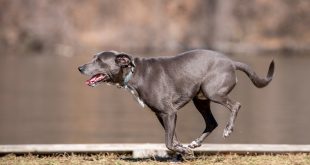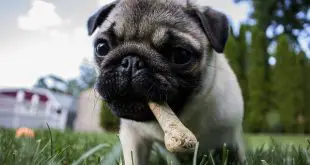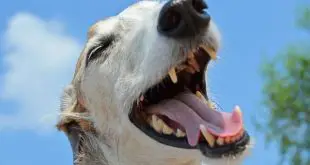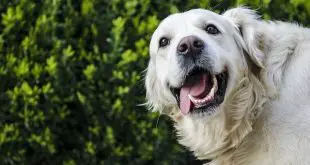This post may contain affiliate links. Please read our disclosure.
Many pet parents are curious if their dog can eat antlers and horns. The short answer is yes, dogs can eat these items, but there are a few things to keep in mind.
In this blog post, we’ll discuss the pros and cons of letting your dog snack on these natural chews, as well as provide some tips for choosing the safest and healthiest antlers and horns.
Article Contents
Can Dogs Eat Antlers?
Can dogs chew on deer antlers? Yes, dogs can chew on deer antlers. Antlers are a nutritious snack for dogs and can provide many benefits, such as promoting healthy teeth and gums.
They are also a great source of minerals, including calcium and phosphorus.
Are Antlers safe for dogs to eat?
Yes, deer and elk antlers are safe for dogs to eat because are a nutritious snack for dogs that are high in calcium and phosphorus. They also help to keep teeth clean and healthy by removing plaque and tartar.
Deer Antlers for Dogs
How to prepare deer antlers for dogs
Before you can give your dog deer antlers, you need to clean and prepare them.
To clean the deer antlers, first, remove any dirt or debris with a brush. You can then soak them in a water and bleach solution to kill any bacteria or parasites. Finally, rinse them off and let them dry.
Once the deer antlers are dry, you can cut off the ends to make them easier for your dog to chew on. You can also grind down any sharp edges.
How to soften deer antlers for dogs
The quickest way to soften deer antlers for dogs would be to put them in boiling water or boiling vinegar, but it’s a good idea not to let your dog drink the water while doing this because it may have some harmful effects.
Another idea is to use a slow cooker with hot water and some olive oil or vegetable oil inside if you don’t want any soap residue left behind on your carpets
Are deer antlers safe for puppies?
Yes, deer antlers make perfect treats for puppies because they are soft and help soothe teething pain.
Deer antlers are a great source of calcium, which is essential for puppies as they grow and develop their milk teeth. In fact, deer antlers contain up to 14 times more calcium than raw beef bones.
They also provide other essential minerals such as phosphorus, magnesium, potassium, zinc, and copper. So if you’re looking for a healthy and delicious treat for your teething puppy, deer antlers are a great choice!
Reindeer antlers for small dogs
Reindeer antlers are good snacks, they help clean teeth, they don’t require any cooking time, and they are great nutritious substitutes for small dogs. What’s not to love about that?
Elk Horn for Dogs
Are Elk antlers good for dogs?
Elk antlers are a favorite treat for dogs because they have a very strong odor and flavor termites, making them a fun chew toy. Additionally, elk antlers don’t splinter easily so they’re great for safety-conscious pet owners.
The only downside is that the antler can be too big to finish in one sitting, but this drawback mostly affects larger breeds like Akitas or Rottweilers.
Moose Antlers for Dogs
Moose antlers are good for dogs because they are a great source of calcium and other minerals, which can help keep your dog’s bones healthy. They also contain keratin, which is beneficial for your dog’s coat and skin.
Additionally, moose antlers provide a great chewing challenge for dogs, which can help keep their teeth clean and healthy.
Moose antler dog chews
Moose antler dog chews are a type of natural dog chew made from the antlers of moose.
They are a popular choice among pet owners because they are durable and contain many nutrients that are beneficial for dogs, such as calcium, phosphorous, and chondroitin sulfate.
They also have a very low risk of splintering or shattering like some other types of natural dog chews.
Moose antler paddles for dogs
Moose antler paddles are a great snack for dogs because they are high in protein and low in fat. They also contain essential minerals and vitamins that help keep your dog healthy and strong.
Cow & Buffalo Horns for Dogs
Wondering whether you can use cow and buffalo horns as chews for your dog? If so, then this section is for you. We will discuss the use of cow and buffalo horns as a safe alternative to traditional chew toys.
Cow and buffalo horns are 100% natural and do not cause dental problems like other chews such as rawhide or nylon bones. When used properly, cow and buffalo horns can last your pup for years!
Continue reading here below and learn more about the benefits of using these types of chews on your pet’s teeth.
Are buffalo horns safe for dogs?
Yes, buffalo horns are safe for dogs. However, it is yet unclear whether eating large quantities of buffalo horn fragments can lead to any detrimental health implications or complications, especially when they are consumed over prolonged periods.
When buying hooves, only buy those made from North American bison (buffalo) instead of African bush cattle/water buffalos because the latter contain a much higher percentage of bacteria called “cystoisospora cauchxni” which can be transmitted to humans and cause life-threatening diarrhea!
Buffalo horn does not pose the same risk to the pets that you might do by just dog food alone can pose. This can include things like salmonella caused by poor handling or insects.
Water buffalo horns & bones for dogs reviews
Water buffalo horns and bones for dogs are a popular natural pet treat. Some people say that they help clean teeth, while others claim that the horns help with joint pain.
Here are some reviews from people who have tried water buffalo horn and bone treats for their dogs:
“My dog loves these things! She’s always been a bit of a grazer, so I was looking for something to give her that would keep her occupied and healthy. These work great!”
“I’ve been giving my dog these horns for about a year now and I’ve seen a remarkable difference in his mobility. He’s 12 years old and is moving around like he’s 6 again.”
Goat & Sheep (Lamb) Horns for Dogs
Are lamb horns safe for dogs?
Yes, according to the American Kennel Club, lamb horns are safe for dogs. They are a good source of protein and essential minerals like zinc and selenium.
However, as with any other new food item that you introduce to your dog, be sure to monitor their reaction and discontinue feeding if they experience any digestive upset.
Ram horn dog chew
A ram horn dog chew is a snack for dogs made of compressed de-boned lamb horn. They are a natural, single-ingredient chew that is long-lasting and healthy for your pup.
Ram horn dog chews are low in fat and calories, and they are a good source of protein. They also help keep your dog’s teeth clean and healthy.
Can dogs eat goat horns?
Yes. Goat horns are safe for dogs and we recommend them to pets with sensitive stomachs because they don’t contain any artificial additives or preservatives and most importantly they don’t give off the gas so you can enjoy good conversation while your pet eats comfortably.
A great way to add some variety into a dog’s food routine, goat horns also provide beneficial enzymes that help break down protein for digestion.
Where to Buy Best Antlers for Dogs
Deer antlers for dogs PetSmart
You can order deer antlers from PetSmart. However, it’s important to be aware that the health benefits of deer antlers are mostly anecdotal – this is because there hasn’t been any systematic study to test their effectiveness for treating arthritis or other ailments.
Deer antlers for dogs PetCo
You can buy antlers at PetCo stores. Antlers are a great source of protein and minerals for your pet and can be purchased at most PetCo locations.
Large Antlers for Dogs
There are a few reasons why some people might want to buy a dog with large antlers. Maybe they think it’s impressive, or maybe they think it means the dog is tougher or more aggressive.
But the truth is that there is no real benefit to having large antlers on a dog. In fact, they can actually be quite dangerous.
Antlers are incredibly heavy and can cause serious damage if they fall off and hit someone or something else. They can also get in the way and make it difficult for dogs to move around freely.
And finally, antlers can be quite sharp, which means they can easily cut skin and fur.
FAQs on Antlers for Dogs
Are deer antlers digestible in the dog’s stomach?
Yes, deer antlers are digestible in the dog’s stomach. However, it is best to give them in small quantities to avoid digestion problems in dogs. Large doses of antlers can cause constipation and other gastric problems in dogs.
When can dogs start eating antlers?
Antlers are brittle so it is recommended not to give your dog one until they are teething. Higher content of minerals can lead to poor teeth. If antler chews are given too early before the dog develops teeth they will become too hard for chewing.
Can puppies eat antler bones?
Yes, puppies can safely eat antler bones because they do help with teething and are nutritious. However, we also recommend giving them a lot more holistic chews and toys to chew on.
Antler bones are quite brittle and can splinter, so we advise removing them from your dog if they get more than small cut marks on their pearly whites.
How long should you let your dog chew on an antler?
Chewing on an antler is a great way to keep your dog’s teeth healthy. They should be allowed to chew on it for 30 to 60 minutes.
At what age can puppies chew antlers?
Puppies can start chewing antlers at around 35 weeks old. However, it’s important to monitor your puppy and make sure they’re not chewing on the antler too aggressively, as this could lead to damage to their teeth.
Also, keep an eye out for any signs that your puppy is having an adverse reaction to the antler (e.g., vomiting, diarrhea, excessive salivation).
Elk vs Deer Antlers for Dogs
Elk antlers are actually much stronger than deer antlers, so they work better as toys for aggressive chewers. There’s also research showing elk antler chews can help build your dog’s immune system by giving them an animal protein boost!
In our experience, antler chews can alleviate anxiety-related behaviors in dogs and housebound pets that spend a lot of time chewing their nails or hooves over their confinement indoors.
Split antlers for dogs and puppies
Split or cracked deer antlers are good for small breeds, but not larger breeds.
Shedding deer antlers are less likely to have parasites, will never moldy in your home, are an ecological replacement for rawhide chews, and are much cheaper than bully sticks! They come in different sizes to suit any breed under 50lbs.
Antler alternatives for dogs
There are a number of chew toys on the market that supply dogs with food and treat dispensers. You can buy dog teething rings or treats, or make your own from readily-available household items.
There is also a wide variety of chew toys available to choose from, such as hard rubber bones, hard rubber cubes for puppies, and regular bones for adult dogs.
These chews will help keep your pup entertained for hours without constantly going back to his old ways of chewing up your shoes and furniture!
You should always supervise the animal when they’re playing with any kind of toy, even if it is made specifically for them – you never know what they’ll start chomping on next!
How long do deer antlers last for dogs?
Many dogs enjoy chewing on deer antlers because the taste and texture appeal specifically to a dog’s preference, and they can even help clean teeth as well.
Needless to say, this makes for an excellent chew toy. Now, about how long does your average deer antler last?
Well, it depends on the size of the dog – larger dogs require large chews – but we do know that dog antler chews can last for more than five months!
Plus we all know that the right kind of chew toy will keep them busy and happy for hours on end.
Can I give my dog a deer antler I found in the woods?
Yes, but it’s a good idea to clean and sterilize the antlers with boiling water before serving them to an animal.
The most important thing with any kind of pet is being sure they’re not going to choke on their food or potentially injure themselves chewing on a broken tooth if leaving it too close to the gum line.
In many cases, cooking your dog’s food can diminish some of these risks.
Can dogs eat deer hooves?
Yes, dogs can eat deer hooves. However, it is recommended that small dogs consume them in order to avoid the risk of choking on a large dog’s deer hoof.
Deer hooves are a great source of collagen, and they provide a number of health benefits for dogs such as improved joint health, stronger teeth and bones, and better digestion.
READ MORE: Can dogs eat fresh anchovies?
 Petnile Comprehensive Pet Care Guides
Petnile Comprehensive Pet Care Guides



